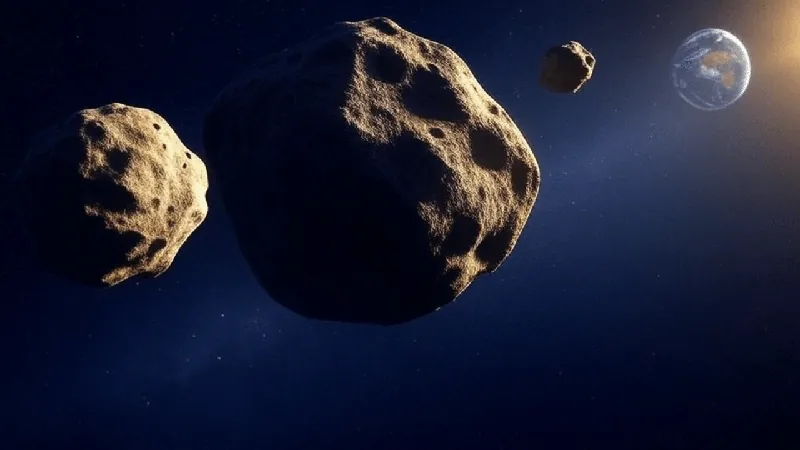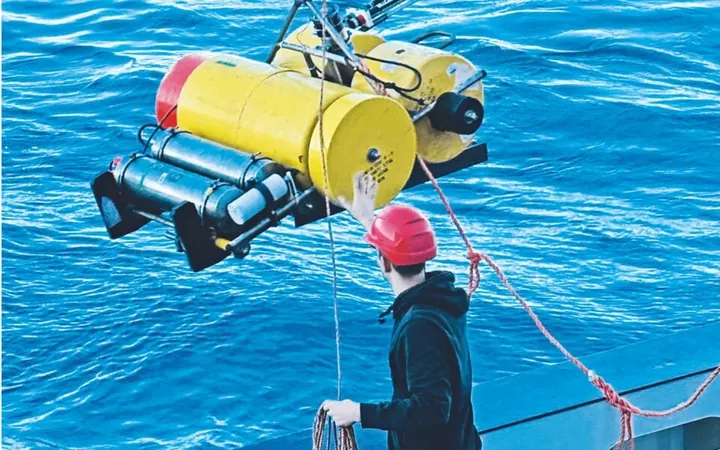
Brace Yourselves! Three Asteroids Make a Close Approach to Earth Today!
2024-12-28
Author: Jia
Today marks an exhilarating day for astronomers and space enthusiasts as three Near-Earth Objects (NEOs) zoom past our planet, providing a golden opportunity to study these celestial wanderers. Two of these asteroids belong to the Aten-class and one to the Apollo-class, each with distinct orbital characteristics that bring them close to Earth.
What Are These Asteroids and Why Should You Care?
On December 27, 2024, three asteroids are set to approach Earth, although none pose any threat to our safety. With advancements in telescopes and tracking technology, scientists can monitor these celestial bodies' movements with unprecedented accuracy. This is not just a regular day in the cosmos; close encounters with asteroids can reveal critical data about their composition, behavior, and the potential risks they may pose in the future.
Meet Asteroid 2024 YQ2: The First of the Close Approaches
Among the trio, Aten-class asteroid 2024 YQ2 will be the first to make its pass, skimming by at a distance of approximately 4.5 million kilometers. While this may sound like a vast distance, it's close enough to allow astronomers to study its trajectory and predict its future movements. With an orbital eccentricity of 0.52, it takes this small asteroid about 331 days to complete a circuit around the Sun, and its high-velocity passage offers valuable insights into the dynamics of similar asteroids.
Asteroid 2024 YA4: A Cosmic Near-Miss
Next up is 2024 YA4, another Aten NEO, which will come significantly closer—at around 2.5 million kilometers. With an orbital period of just 352 days, this asteroid is a frequent visitor in the neighborhood of Earth. Its approach provides astronomers with an ideal opportunity to monitor not only its trajectory but also its size and potential behaviors, enriching our understanding of Aten-class objects.
Apollo Asteroid 2024 YC1: A Rare Glimpse
Lastly, the Apollo-class asteroid 2024 YC1 will grace us with its presence, approaching within an estimated 5.9 million kilometers. While this distance might seem cosmic, it’s a notable event worth watching, considering the Apollo asteroids can have more unpredictable paths that intersect with Earth's orbit. Traveling in a much longer orbital cycle of approximately 1,751 days, 2024 YC1 is a fascinating subject of study, with approaches occurring every few years.
Why Monitoring Asteroids is Crucial
Understanding these near-Earth objects is more than just an academic exercise. Researchers are continuously focusing on how these celestial bodies behave, especially with regard to their potential intersections with our planet. Each approach is a chance to refine our global monitoring systems, ultimately ensuring the safety of our world and expanding our knowledge of the universe.
Stay Tuned for Updates
As these asteroids pass by today, scientists will be watching closely, compiling data that could inform future asteroid detection and deflection strategies. Don’t miss out on the excitement—this cosmic ballet not only helps safeguard our planet but also unravels the mysteries of our solar system!




 Brasil (PT)
Brasil (PT)
 Canada (EN)
Canada (EN)
 Chile (ES)
Chile (ES)
 España (ES)
España (ES)
 France (FR)
France (FR)
 Hong Kong (EN)
Hong Kong (EN)
 Italia (IT)
Italia (IT)
 日本 (JA)
日本 (JA)
 Magyarország (HU)
Magyarország (HU)
 Norge (NO)
Norge (NO)
 Polska (PL)
Polska (PL)
 Schweiz (DE)
Schweiz (DE)
 Singapore (EN)
Singapore (EN)
 Sverige (SV)
Sverige (SV)
 Suomi (FI)
Suomi (FI)
 Türkiye (TR)
Türkiye (TR)